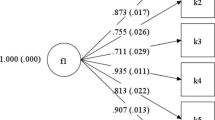Summary
Partners could be useful as informants of postpartum women’s depressive symptoms; however, currently no partner-ratings exist. The Edinburgh Postnatal Depression Scale – Partner (EPDS-P) is a 10-item measure adapted from the Edinburgh Postnatal Depression Scale (EPDS). The EPDS-P is expected to converge with the EPDS and other measures of depressive symptoms and to demonstrate incremental validity in the prediction of depressive symptoms. 101 women and their partners completed multiple measures of depressive symptoms during the first six weeks postpartum. Initial results suggest adequate reliability and validity for the EPDS-P. The EPDS-P showed moderate convergent correlations with other depression measures. Longitudinal correlations showed a link between the two-week EPDS-P and the six-week EPDS. The EPDS-P demonstrated incremental validity over and above the EPDS. Results supported the use of the EPDS-P as a valid partner-rating scale. The findings confirm that partners of postpartum women are valuable resources when assessing depressive symptoms.
Similar content being viewed by others
References
M Atchison J Condon (1994) ArticleTitleThe association between spouse-reported Type A behaviour pattern and coronary heart disease Aust N Z J Psychiatry 28 298–301 Occurrence Handle7993285 Occurrence Handle1:STN:280:DyaK2M%2FosFGjsA%3D%3D
A Beck C Ward M Mendelson J Mock J Erbaugh (1961) ArticleTitleAn inventory for measuring depression Arch Gen Psychiatry 4 561–569 Occurrence Handle13688369 Occurrence Handle1:STN:280:DyaF3c%2FgslKisg%3D%3D
SB Campbell JF Cohn C Flanagan S Popper T Meyers (1992) ArticleTitleCourse and correlates of postpartum depression during the transition to parenthood Dev Psychopathol 4 29–47 Occurrence Handle10.1017/S095457940000554X
J Condon (1988) ArticleTitleThe assessment of Type A behavior pattern: results from a spouse-report approach Psychol Med 18 747–755 Occurrence Handle3186873 Occurrence Handle1:STN:280:DyaL1M%2Fkt1GltA%3D%3D Occurrence Handle10.1017/S003329170000845X
J Condon C Corkindale (1997) ArticleTitleThe assessment of depression in the postnatal period: A comparison of four self-report questionnaires Aust N Z J Psychiatry 31 353–359 Occurrence Handle9226080 Occurrence Handle1:STN:280:DyaK2szmvFKhsw%3D%3D
J Cox Y Connor R Kendall (1982) ArticleTitleProspective study of the psychiatric disorders of childbirth Br J Psychiatry 140 111–117 Occurrence Handle7074291 Occurrence Handle1:STN:280:DyaL387otleksA%3D%3D
J Cox J Holden (2003) Perinatal mental health: A guide to the Edinburgh Postnatal Depression Scale Gaskell London
J Cox J Holden R Sagovsky (1987) ArticleTitleDetection of postnatal depression: Development of the 10-item Edinburgh Postnatal Depression Scale Br J Psychiatry 150 782–786 Occurrence Handle3651732 Occurrence Handle1:STN:280:DyaL1c%2FgtFahtw%3D%3D
WW Eaton K Neufeld L Chen G Cai (2000) ArticleTitleA comparison of self-report and clinical diagnostic interviews for depression: Diagnostic Interview Schedule and Schedules for Clinical Assessment in Neuropsychiatry in the Baltimore Epidemiologic Catchment Area follow-up Arch Gen Psychiatry 57 217–222 Occurrence Handle10711906 Occurrence Handle1:STN:280:DC%2BD3c7nsFSksg%3D%3D Occurrence Handle10.1001/archpsyc.57.3.217
IH Gotlib JM Hooley (1988) Depression and marital distress: Current status and future directions S Duck DF Hay (Eds) et al. Handbook of personal relationships: Theory, research and interventions John Wiley & Sons Chichester 543–570
M Hamilton (1960) ArticleTitleA rating scale for depression J Neurol Neurosurg Psychiatry 32 50–55
E Hock MB Schirtzinger WJ Lutz K Widaman (1995) ArticleTitleMaternal depressive symptomatology over the transition to parenthood: Assessing the influence of martial satisfaction and marital sex role traditionalism J Fam Psychol 1 79–88 Occurrence Handle10.1037/0893-3200.9.1.79
Hollingshead AB (1975) Four factor index of social status. Unpublished manuscript, Yale University, New Haven, CT.
M Hunt J Auriemma AC Cashaw (2003) ArticleTitleSelf-report bias and underreporting of depression on the BDI-II J Personality Assess 80 26–30 Occurrence Handle10.1207/S15327752JPA8001_10
JH Kamphuis PMG Emmelkamp V de Vries (2003) ArticleTitleModerated validity of clinical informant assessment: Use in depression and personality Clin Psychol Psychother 10 102–107 Occurrence Handle10.1002/cpp.355
R Kumar KM Robson (1984) ArticleTitleA prospective study of emotional disorders in childbearing women Br J Psychiatry 144 3–47
K Larsen MW O’Hara (2002) The effects of postpartum depression on close relationships JH Harvey A Wenzel (Eds) A Clinician’s Guide to maintaining and enhancing close relationships Lawrence Erlbaum Associates Mahwah 157–176
Martin ME (1977) A maternity hospital study of psychiatric illness associated with childbirth. Ir J Med Sci: 239–244.
L Murray P Cooper (1997) ArticleTitlePostpartum Depression and child development Psychol Med 27 253–260 Occurrence Handle9089818 Occurrence Handle1:STN:280:DyaK2s3ksFSmuw%3D%3D Occurrence Handle10.1017/S0033291796004564
MW O’Hara (1995) Postpartum depression causes and consequences Springer New York
MW O’Hara A Swain (1996) ArticleTitleRates and risk of Postpartum Depression: A meta-analysis Int Rev Psychiatry 8 37–54
MW O’Hara EM Zekoski LH Philipps EJ Wright (1990) ArticleTitleA controlled prospective study of postpartum mood disorders: Comparison of childbearing and nonchildbearing women J Abnorm Psychol 99 3–15 Occurrence Handle2307763 Occurrence Handle1:STN:280:By%2BC2s7jt1c%3D Occurrence Handle10.1037/0021-843X.99.1.3
S Page S Bennesch (1993) ArticleTitleGender and reporting differences in measures of depression Can J Behav Sci 25 579–589
ES Paykel EM Emms J Fletcher ES Rassaby (1980) ArticleTitleLife events and social support in puerperal depression Br J Psychiatry 136 339–346 Occurrence Handle7388241 Occurrence Handle1:STN:280:DyaL3c3itFKgsg%3D%3D Occurrence Handle10.1192/bjp.136.4.339
J Riskind A Beck G Brown R Steer (1987) ArticleTitleTaking the measure of anxiety and depression, validity of the reconstructed Hamilton scales J Nerv Ment Dis 175 474–479 Occurrence Handle3625186 Occurrence Handle1:STN:280:DyaL2szhtVChtA%3D%3D Occurrence Handle10.1097/00005053-198708000-00005
RD Schweitzer GP Logan D Strassberg (1992) ArticleTitleThe relationship between marital intimacy and postnatal depression Aust J Mar Fam 13 19–23
S Stuart M O’Hara (1995) ArticleTitleInterpersonal Psychotherapy for postpartum depression: A treatment program J Psychother Pract Res 4 18–29
P Zelkowitz TH Milet (1996) ArticleTitlePostpartum psychiatric disorders: Their relationship to psychological adjustment and marital satisfaction in the spouses J Abnorm Psychol 105 281–285 Occurrence Handle8723010 Occurrence Handle1:STN:280:DyaK28zhslKktg%3D%3D Occurrence Handle10.1037/0021-843X.105.2.281
Author information
Authors and Affiliations
Rights and permissions
About this article
Cite this article
Moran, T., O’Hara, M. A partner-rating scale of postpartum depression: The Edinburgh Postnatal Depression Scale – Partner (EPDS-P). Arch Womens Ment Health 9, 173–180 (2006). https://doi.org/10.1007/s00737-006-0136-x
Received:
Accepted:
Published:
Issue Date:
DOI: https://doi.org/10.1007/s00737-006-0136-x




